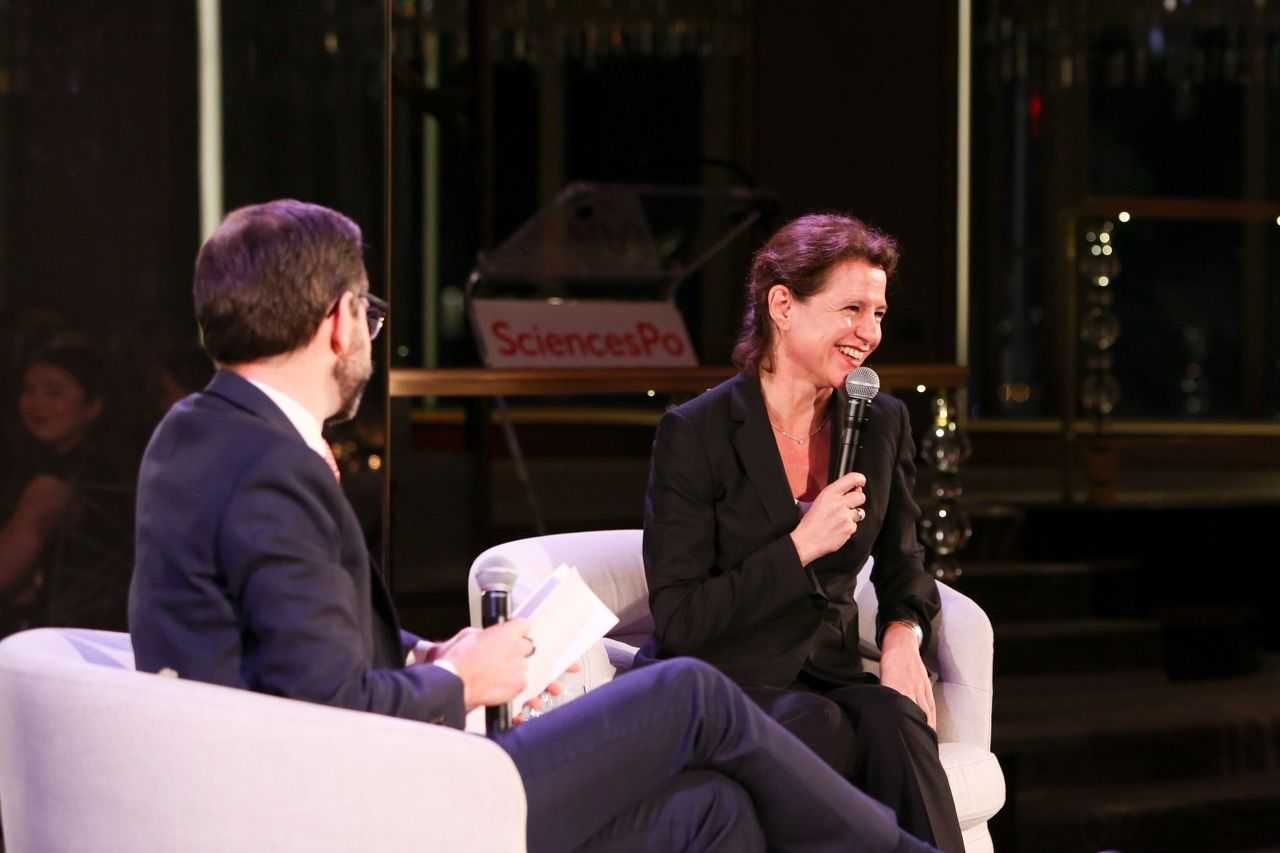Home>From Oil Rigs to Green Energy: MacGregor’s Vision

12.05.2025
From Oil Rigs to Green Energy: MacGregor’s Vision
On Tuesday, May 6th, the Sciences Po American Foundation held its 2025 Annual Benefit Dinner, honoring Catherine MacGregor, CEO of ENGIE, with the Stanley Hoffmann Award. Her 30-year career in the energy sector demonstrates exceptional contributions to one of the greatest challenges of our time: the global energy transition.
MacGregor was interviewed by Andrew Edgecliffe-Johnson, CEO Editor of Semafor. During their conversation, she reflected on her commitment to forward-looking leadership, echoing Sciences Po’s mission to educate responsible leaders who confront global challenges with integrity and innovation.
She opened by recounting her unconventional start. Fresh out of engineering school in Paris, she rejected coding in favor of fieldwork, seeking a new challenge. That decision led her to become the only woman on an oil rig in the Democratic Republic of the Congo, where she quickly adapted and earned respect in a male-dominated environment. This early test of resilience shaped a career defined by transformation and bold choices.
MacGregor described ENGIE’s purpose as accelerating the energy transition. Operating in 31 countries with 100,000 employees, the company focuses on electricity production, infrastructure, and customer service. Today, half its electricity comes from renewables, and it’s investing in “smart electrons”- green energy delivered where and when it’s needed.
Leading a utility company, MacGregor rejects the notion that utilities are dull: “Sometimes boring is good… utility means useful.” She stressed that being useful to society is vital, and ENGIE’s strategy emphasizes integrating renewables with storage and digital solutions to ensure reliability and affordability.
As CEO, she has led a sweeping transformation at ENGIE, refocusing operations, divesting non-core assets, and aligning business with purpose. “You can’t do energy transition if you’re not making money,” she said, underscoring the need for financial sustainability in supporting long-term investment.
Her leadership philosophy centers on truth and purpose. She noted that CEOs rarely get candid feedback, especially when joining from outside of the company: “People don’t tell you the truth. They tell you what they think you want to hear.” To counter this, she emphasized the importance of team-building and creating spaces for honest dialogue.
MacGregor offered a wide-ranging perspective on how different regions are progressing toward carbon neutrality. She pointed to China’s dominant role in installing 60% of the world’s new renewable capacity in 2023, and praised India’s rapid development in green energy. The Middle East, too, is scaling large solar projects, and Europe generated 47% of its electricity from renewables last year.
In the U.S., ENGIE has invested $10 billion, especially in Texas, in solar, wind, and battery projects. However, uncertainty surrounding federal policies like the Inflation Reduction Act has paused new investments. “Customers are knocking, but we need clarity,” she said.
Electrification is ENGIE’s key growth driver. Europe, despite modest economic growth, must more than double electricity use to reach net-zero by 2050. In the U.S., data centers, AI, and crypto are pushing energy systems to their limits.
While AI increases demand, MacGregor believes it will also enhance efficiency. “AI can help us invest only in what’s really needed,” she said, pointing to its potential to reduce waste and optimize grids.
On Europe’s response to geopolitical shifts, she noted a growing recognition that energy transition must not come at the cost of industrial competitiveness. While Europe brings stability and commitment to decarbonization, she warned, “We’re just too slow in everything… we need to go much faster.”
Reflecting on her journey, MacGregor highlighted adaptability as her most essential trait. Leading an organization like ENGIE, she said, means surrounding oneself with the right people and ensuring the company’s purpose resonates throughout.
(credits: Aria Isadora)